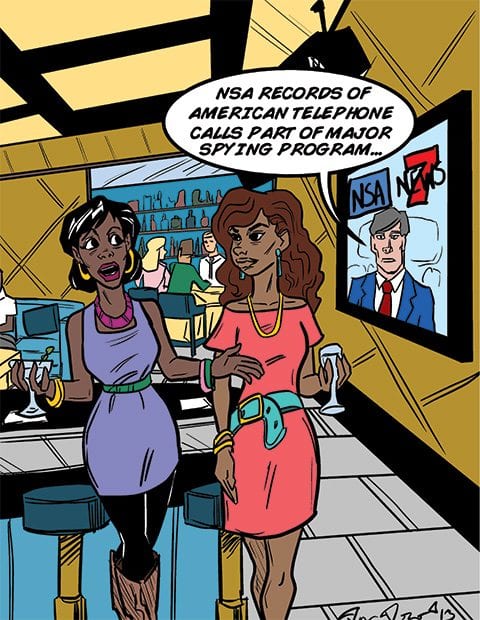
After 9/11 and the Boston Marathon bombings, Americans are aware that they are targets for terrorists. Recently, the U.S. State Department closed 21 embassies and consulates in the Middle East and Africa and issued travelers warnings in response to uncovered threats of attack. Now the government is concerned with the establishment of surveillance programs that do not violate the constitutional rights of American citizens. The National Security Agency (NSA) spy program collects data on everyone’s telephone calls, including the date, time and duration, together with the numbers involved.
The sheer magnitude of the unauthorized telephone surveillance program of the NSA stunned Washington insiders who thought they were knowledgeable about the nation’s secrets. According to official assurances, the lines are not tapped without a warrant. Nonetheless, this enormous surveillance program is considered by civil libertarians to be a violation of the Fourth Amendment right in the U.S. Constitution, which protects “against unreasonable searches and seizures.”
Surprisingly, public reaction to the publicity about the NSA project was relatively mild. Perhaps that is because so many Americans have already surrendered their right of privacy to the Internet. Consequently, a breach of Fourth Amendment protections is no longer such a serious violation. People know that when they conduct a search on Google there is an analysis of the search to evaluate the best prospects for ads. No specific consent is given for that.
Even more invasively, people voluntarily divulge information on Facebook that would be considered indiscreet even if it was whispered only to a close confidant. And some people release quasi-erotic photos of themselves to roam in cyberspace. The possibility that the government might one day listen in on a phone call is trivial by comparison.
Also, African Americans and other minorities often suffer from invasions of their Fourth Amendment protections that are far more grievous than recording the time, duration and date of a telephone call. In New York and other major cities the police summarily stop and search youthful male pedestrians on the basis of fancied suspicions. Those who are riding in a car can be pulled over under the “driving while black” policy. Those who refuse to allow a search for drugs are often required to wait for an extended time until trained drug sniffing dogs arrive.
Nonetheless, it would be presumptuous to presume that all African Americans share the same attitude toward the NSA surveillance program. Undoubtedly there is a common concern about the heightened risk to the nation created by the terrorists’ aggression. A bill in Congress to curtail the NSA surveillance program was defeated 217-205.
Ideally, all operations in a democratic government should be public and transparent. For obvious reasons that principal cannot apply to military secrets. In the United States a court established by the Foreign Intelligence Surveillance Act is supposed to protect the constitutional rights of individuals.
The conflict is between the maintenance of the secrecy necessary to defeat the terrorists and maintaining the protection of constitutional rights. Since African Americans have been denied many civil rights protections, it is logical that their primary concern should be the danger of terrorist attacks.


![Banner [Virtual] Art Gallery](https://baystatebanner.com/wp-content/uploads/2024/04/Cagen-Luse_Men-at-store-e1713991226112-150x150.jpg)



